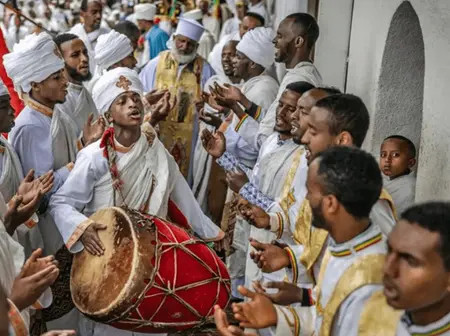Enkutatash is Ethiopia’s special New Year festival, which began on September 11, 2025.
It’s unique because Ethiopia follows its own calendar, which is seven years behind the rest of the world.
The celebration marks the start of spring and is filled with lively family gatherings.
People feast on traditional foods like injera and doro wat, light bonfires, and enjoy the beauty of blooming yellow daisies.
This year’s event was especially important as it happened at the same time as the launch of a major dam project, making it a powerful moment of hope and renewal for the country.
Ethiopia’s calendar is unique, operating on a different system from the widely used Gregorian calendar.
This solar calendar, which has roots in ancient Coptic and Ge’ez traditions, consists of 13 months—12 months of 30 days each and a 13th month called Pagume, which has five or six days.
The calendar is seven to eight years behind the Gregorian one due to a different calculation of the date of Christ’s birth.
This date, used by the Ethiopian Orthodox Church, was never changed to align with the revisions made by the Catholic Church in the 16th century.
This distinct calendar system is more than just a different way of counting; it is a point of national pride and a symbol of Ethiopia’s uncolonized past.
As one of the few African nations to have maintained its independence, Ethiopia held on to its traditional calendar.
The holiday’s name, “Enkutatash,” which means “gift of jewels” in Amharic, is said to be inspired by a 3,000-year-old tale of the Queen of Sheba’s return from King Solomon’s court around 980 BC.
It is said that upon her return, the people showered her with precious stones, a tradition that continues to symbolize a new beginning.
Enkutatash marks the end of the long rainy season and the start of spring.
The highlands are covered in bright yellow daisies called Adey Abeba, a key symbol of the holiday.
In bustling markets in Addis Ababa, such as Addisu Gebeya, vendors sell these flowers, along with livestock for New Year’s feasts.
It’s common to see families buying sheep, chickens, and spices for the celebratory meal.
On New Year’s Eve, families gather for a traditional dinner, with the centerpiece often being injera, a tangy flatbread made from teff, served with doro wat, a spicy chicken stew.
Other dishes might include kitfo, spiced raw beef, or various vegetable curries.
The meal is usually followed by a coffee ceremony, a significant social ritual in which coffee beans are roasted, ground, and brewed fresh.
After the meal, people light bonfires called chibo to “burn the old year,” singing and dancing around them.
The celebration is also a time for giving back.
This year, Prime Minister Abiy Ahmed and First Lady Zinash Tayachew served meals to elders and those in need at the National Palace, a gesture that highlighted the holiday’s focus on community and generosity.
Enkutatash is celebrated both within Ethiopia and by the country’s diaspora.
In communities around the world, like those in Nairobi, Kenyan Ethiopians hold their own celebrations with traditional food, music, and the exchange of daisies.
These events help to keep the connection to their heritage strong, particularly for younger generations who may not have grown up in Ethiopia.
This year’s Enkutatash celebration also coincided with a significant national event: the formal launch of the Grand Ethiopian Renaissance Dam (GERD).
The dam, Africa’s largest hydroelectric project, is a major source of national pride and a symbol of the country’s progress and future prosperity.
The synchronization of the dam’s launch with the New Year’s festivities underscored the theme of renewal and new beginnings that is central to Enkutatash.
As Ethiopia began its journey into the year 2018, the celebrations were a powerful reminder that a new year is not just about a change in date but a moment of shared hope and renewal, a chance to look forward to a brighter future.

Leave a Reply